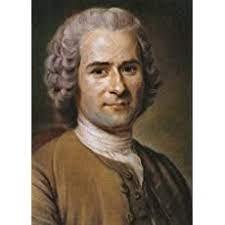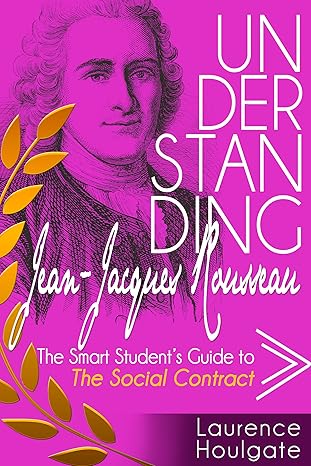ROUSSEAU'S PARADOX: WE ARE BORN FREE IN CHAINS

ROUSSEAU'S PARADOX: WE ARE BORN FREE IN CHAINS
 | ||
| Jean-Jacques Rousseau |
Last week I invited a guest to write a blog on Rousseau's The Social Contract. I asked the guest to discuss Rousseau's famous paradox that we are both born free and born in chains. The question for my guest: "How is this possible?" The name of my guest is A.I. Perplexity. Here is Perplexity's answer:
The opening line of Jean-Jacques Rousseau's "The Social Contract" presents one of the most provocative paradoxes in political philosophy: "Man is born free, and everywhere he is in chains." This statement, followed by the observation that those who believe themselves masters of others are themselves enslaved, establishes the fundamental tension that Rousseau explores throughout his work. His subsequent questions -- how this transformation from freedom to bondage occurred and what might legitimize it-form the core of his political philosophy and have influenced political thought for centuries.
The Paradox of Freedom and Authority
Rousseau's central concern revolves around a seemingly irresolvable contradiction: humans are naturally free beings, yet they find themselves constrained by social and political institutions everywhere. This paradox raises fundamental questions about political obligation and the legitimacy of authority. In exploring this tension, Rousseau sought "to find a form of association able to defend and protect with the whole common force the person and goods of every associate, and of such a nature, that each, uniting himself with all, may still obey only himself, and remain as free as before". This becomes the fundamental problem that his concept of the social contract attempts to solve.
The paradox strikes at the heart of political philosophy-how can external authority be reconciled with individual freedom? How can we be governed by others while remaining free? These questions were particularly relevant during the Enlightenment when traditional sources of authority were being challenged.
Natural Freedom Versus Civil Freedom
To understand Rousseau's paradox, we must first recognize his distinction between different types of freedom. In the state of nature, humans enjoy what Rousseau calls "physical freedom"-the absence of external restraints on behavior. However, this natural freedom is limited by our impulses and desires. By entering civil society, we give up this unrestricted physical freedom but gain something potentially more valuable: civil freedom, or the ability to think rationally and morally.
Rousseau argues that only within civil society can we become fully human by developing our capacity for moral reasoning. This transformation from natural to civil freedom represents not simply a loss but potentially a profound gain-if the political arrangement is legitimate.
The Transition from Nature to Society
When confronted with the question of how humans transitioned from their natural state of freedom to the constraints of society, Rousseau notably responds, "I do not know". This admission reflects not ignorance but a recognition that the historical origins of political society are lost to time and likely arose gradually through complex developments.
While Rousseau employs the social contract theory as a conceptual framework, he does not present it as historical fact but rather as a way to understand the legitimate basis of political association. Unlike some of his predecessors who used the contract model to justify existing power structures, Rousseau uses it to establish criteria for legitimate authority.
The Development of Property and Inequality
Despite his stated uncertainty about the exact historical transition, Rousseau does provide some insights in his earlier work, "Discourse on the Origin of Inequality." He identifies private property as a crucial development that transformed human relations: "The first man who, having enclosed a piece of ground, bethought himself of saying 'This is mine,' and found people simple enough to believe him, was the real founder of civil society."
This establishment of property led to competition, conflict, and inequality: "There arose rivalry and competition on the one hand, and conflicting interests on the other". These developments created new needs for social order and protection that natural freedom could not provide, leading to the formation of political institutions.
For Rousseau, the fundamental question is not merely how society came to be, but what makes political authority legitimate rather than mere oppression. His answer lies in his conception of the social contract-not as a historical event but as the principle that should underlie any legitimate political association.
Rousseau's social contract differs significantly from earlier contract theories. It's not an agreement between rulers and subjects that legitimizes the authority of the former over the latter. Instead, it's an agreement among equals to create a new collective entity-the sovereign people.
The Conditions of Legitimate Authority
What makes political authority legitimate in Rousseau's view? Several key elements emerge from his work:
First, legitimate authority must be based on consent rather than force. Rousseau explicitly "contrasts a legitimate social order with a system of rules that is merely the expression of power". Mere coercion can never create true political obligation.
Second, authority must be directed toward the common good rather than serving particular interests. This is central to Rousseau's concept of the "general will".
Third, legitimate political arrangements must preserve human freedom rather than merely constraining it. As Rousseau states, the fundamental problem is to find a form of association where each person, "uniting himself with all, may still obey only himself, and remain as free as before."
The General Will and Popular Sovereignty
Rousseau's most distinctive contribution to political thought is his concept of the "general will" as the basis of legitimate authority. The general will is not simply the sum of individual desires or the will of the majority, but rather represents what is in the common interest of the community as a whole.
Understanding the General Will
The general will emerges when citizens deliberate not about their private interests but about the common good. It aims at what benefits the community collectively. Unlike particular wills, which focus on individual advantage, the general will concerns itself with equality and justice for all members of society.
This concept allows Rousseau to resolve his initial paradox: when people obey laws that express the general will, they are in fact obeying themselves as citizens rather than submitting to an external authority. This transforms political obligation from external constraint to self-legislation.
Sovereignty of the People
Closely related to the general will is Rousseau's radical conception of sovereignty. For Rousseau, sovereignty resides inalienably in the people as a collective body-not in rulers or representatives, As search result indicates, "Contrary to Madison, Rousseau argues that direct (pure) democracy is the only form of government in which human freedom can be realized."
This sovereignty cannot be divided, alienated, or represented. The people must directly exercise their sovereign power through active participation in the formation of laws. This collective exercise of sovereignty creates legitimate authority because citizens are both the authors and subjects of law.
Implications and Challenges of Rousseau's Theory
Rousseau's theory of the social contract has profound implications for how we understand freedom and legitimate governance. By redefining freedom in terms of rational self-determination rather than the absence of constraint, Rousseau suggests that properly constituted political society enhances rather than diminishes freedom.
The Communitarian Dimension
One significant implication of Rousseau's theory is its communitarian orientation. As noted in search result, "If we can only be fully human under the auspices of the social contract, then that contract is more important than the individuals that agree to it." The individual finds fulfillment and realizes their humanity through participation in the political community.
This communitarian perspective has led some critics to worry about the potential for majority tyranny or the subordination of individual rights to collective will. However, Rousseau insists that the general will cannot aim at harming any particular citizen, as it must apply equally to all.
Authenticity and Modern Resonance
Rousseau's ideas about freedom and legitimacy connect to his broader concern with authenticity. As noted in search result, "Rousseau's work made a significant contribution to the popularization of authenticity." His emphasis on self-determination and living according to principles one has rationally accepted continues to resonate in modern discussions of autonomy and authentic living.
Conclusion
Rousseau's paradox--that man is born free yet everywhere in chains--remains a powerful framing of the tension between natural freedom and political authority. His response to the questions of how this occurred and what makes it legitimate revolutionized political thought by grounding legitimate authority in the consent and active participation of citizens.
Though Rousseau admits he "does not know" exactly how the historical transition from natural freedom to civil society occurred, he provides a powerful normative framework for evaluating when such constraints become legitimate. The legitimacy of political authority comes not from tradition, divine right, or superior force, but from its foundation in the general will of the people exercising their collective sovereignty.
In a world still struggling with questions of political legitimacy and the proper scope of authority, Rousseau's insights about the relationship between freedom and legitimate governance remain profoundly relevant. His vision of a political community where obedience to law becomes an expression of freedom rather than its negation continues to inspire political movements and theoretical reflections on the meaning of democratic citizenship.
Sources
1 Houlgate, Laurence D.
Understanding Jean-Jacques Rousseau: The Smart Student's Guide to The Social Contract
https://www.amazon.com/dp/B096BD4LL5
2 https://www.perplexity.ai/

- News
- Mysticism
- Horoscope
- Bath & Body
- Soap Making
- Books
- Art
- Causes
- Crafts
- Dance
- Drinks
- Film
- Fitness
- Food
- Jogos
- Gardening
- Health
- Início
- Literature
- Music
- Networking
- Outro
- Party
- Religion
- Shopping
- Sports
- Theater
- Wellness



